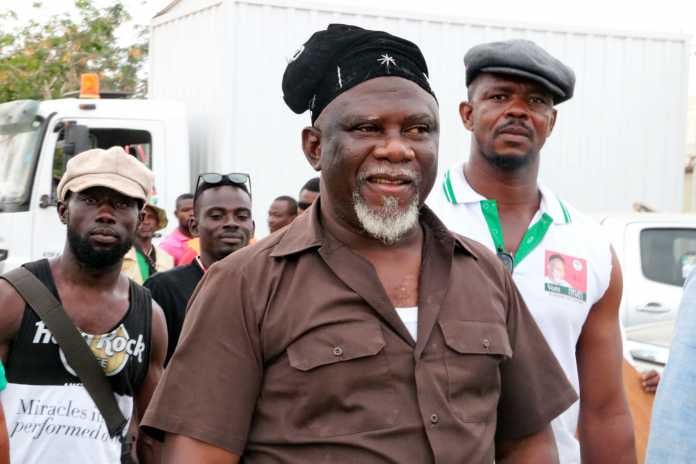Escalating Tensions in Akwatia By-Election: NDC Accuses NPP of Sabotage and Threatens Retaliation
The Akwatia constituency by-election, a crucial political contest capturing national attention, has been marred by allegations of sabotage and counter-accusations between the two dominant parties, the National Democratic Congress (NDC) and the New Patriotic Party (NPP). The NDC’s First Vice Chairman, Chief Sofo Azorka, has directly accused NPP Member of Parliament for Efutu, Alexander Afenyo-Markin, and his supporters of orchestrating the removal and defacement of NDC campaign posters within Akwatia. This accusation has injected an additional layer of tension into the already closely watched by-election, raising concerns about the potential for further escalation and disruption of the electoral process. Mr. Azorka’s strong warning of retaliation, promising to instigate calls for a by-election in Mr. Afenyo-Markin’s Efutu constituency, signals the NDC’s intent to respond forcefully to any perceived acts of provocation.
The accusations leveled by the NDC highlight the highly competitive nature of the Akwatia by-election and the perceived stakes involved for both parties. By-elections, often viewed as barometers of public sentiment and indicators of future electoral trends, can significantly impact the political landscape. The intensity of this particular contest, amplified by the allegations of poster defacement, suggests both parties recognize the symbolic importance of securing victory in Akwatia. The deployment of a significant police presence throughout the constituency underscores the authorities’ awareness of the potential for tensions to boil over into more serious confrontations between supporters of the rival parties. Despite this heightened security presence, minor skirmishes have already been reported, further emphasizing the volatile atmosphere surrounding the by-election.
The NDC’s claim of targeted destruction of their campaign materials points to a broader concern about the integrity and fairness of the electoral process. Such acts, if proven, could be interpreted as attempts to suppress voter turnout or manipulate public perception in favor of a particular candidate. The removal of campaign posters, which serve as crucial tools for disseminating information about candidates and their platforms to potential voters, can hinder informed decision-making and undermine democratic principles. The NDC’s forceful response, threatening retaliatory action, reflects their determination to protect their campaign efforts and ensure a level playing field. This response also suggests a deep-seated mistrust between the two parties, with each side seemingly anticipating and preparing for potential acts of aggression from the other.
While the accusations of sabotage dominate the current narrative surrounding the Akwatia by-election, the underlying electoral dynamics remain crucial. Pollster Musah Dankwah’s prediction of a narrow victory for the NDC candidate, Bernard Bediako Baidoo, further intensifies the pressure on both parties. The projected 53% to 47% split suggests a closely contested race, leaving little room for complacency on either side. This narrow margin underscores the importance of every vote and amplifies the potential impact of any perceived irregularities or acts of sabotage. The close nature of the projected result also increases the likelihood of post-election disputes and challenges, particularly if the final tally aligns closely with the pollster’s prediction.
The implications of the Akwatia by-election extend beyond the immediate outcome of the contest. The allegations of sabotage, the strong rhetoric employed by party leaders, and the heightened security presence all contribute to a perception of political instability and potential for conflict. This perception can erode public trust in the electoral process and undermine the legitimacy of the elected representative. Furthermore, the escalating tensions between the NDC and NPP in Akwatia could spill over into other political arenas, further polarizing the national political landscape and hindering efforts to address pressing national issues. The by-election serves as a microcosm of the broader political dynamics at play in Ghana, highlighting the challenges of maintaining a peaceful and democratic environment in the face of intense political competition.
The events unfolding in Akwatia underscore the urgent need for all stakeholders, including political parties, electoral authorities, security forces, and civil society organizations, to work collaboratively to de-escalate tensions and ensure a free, fair, and credible by-election. Political leaders must refrain from inflammatory rhetoric and engage in constructive dialogue to address grievances and promote peaceful coexistence. Security forces should maintain a neutral and impartial stance, ensuring the safety and security of all citizens while upholding the right to peaceful assembly and freedom of expression. Electoral authorities must conduct a thorough and transparent investigation into the allegations of poster defacement, holding those responsible accountable and taking steps to prevent similar incidents in future elections. Finally, civil society organizations play a vital role in promoting voter education, monitoring the electoral process, and facilitating dialogue between different political factions. By working together, these stakeholders can contribute to a more peaceful and democratic electoral environment in Akwatia and throughout Ghana.














